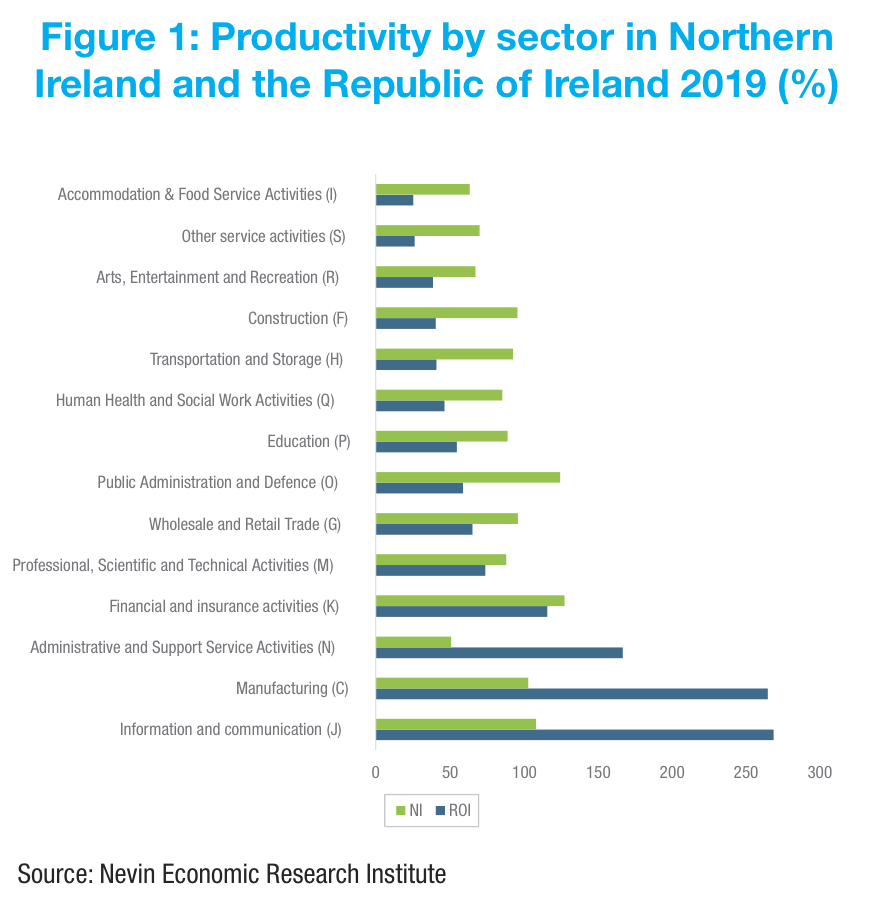Re-examination of economic supports required

NERI research highlights increased policy decisions must match productivity goals to build a more competitive economy.
Within Productive Economy Series: Part 1 Transitioning to high value sectors, co-director of the Nevin Economic Research Institute (NERI), Paul Mac Flynn, analyses how economic activity and employment, allocated to certain industries and sectors contributes to building a more productive economy.
Latest discussion on the cost of Irish unity sparked a debate surrounding productivity levels in Ireland – north and south, with prominent economists examining how integrating both economies may prove costly. NERI’s study reexamines the discourse on productivity and living standards, north and south.
Productivity
Productivity is a fundamental metric for evaluating economic performance because it reflects the ability for an economy to provide adequate living standards. High productivity is typically associated with higher wages, contributing to economic growth, and creating job opportunities. These factors thereby elevate overall living standards.
However, not all sectors are equally productive. Mac Flynn acknowledges that some industries consistently outperform others, and within those high-performing sectors, not all firms reinvest their profits into employee wages preferring to retain higher profits. In this context, there is a need for careful monitoring and appropriate regulatory frameworks to ensure economic productivity is improved.
In this regard, the study emphasises that a successful economy enables firms to offer wages that reflect their success in the marketplace. Firms that are efficient and well run are then in a position to provide employment which contributes to a high standard of living for their employees.
Nonetheless, Mac Flynn outlines that overrepresentation in low-value sectors can also lead to a less productive economy, with these jobs characterised as “low paid, insecure, and with little or no career progression”.
Integrating economies and economic challenges
The productivity debate has extended to discussions about integrating the two economies in Ireland – north and south. While Northern Ireland has been facing productivity challenges for nearly two decades, the Republic’s productivity also faces challenges around the dominant role of multinational corporations and profit-sharing activities.
Mac Flynn’s research suggests that an attempt at integrating the economies may produce several challenges, given the differences in productivity levels and economic structures. According to Mac Flynn, to enhance overall productivity, the mix of economic activity and efficiency among firms is essential. Yet, despite this key factor, Mac Flynn also notes that it is not the sole contributor to improving overall productivity.
“A firm producing meat products can be extremely efficient, but it may never be able to match the value of the output that a software firm produced even if both use the same number of resources,” he outlines.
Figure 1, produced by NERI, illustrates variations in productivity across sectors, with finance and insurance, manufacturing, and information and communication consistently among the top performing sectors in both Northern Ireland and the Republic.
Conversely, arts, entertainment, and recreation, along with accommodation and food, are typically the least productive and lowest-paid. Despite this, lower wages do not necessarily reflect lower productivity, as other factors like bargaining power can also play a role.
Regarding employment allocation, the study reveals Northern Ireland and the Republic have a disproportionately high employment rate in the accommodation and food sector compared to other EU countries.
Mac Flynn explains that the hospitality sector’s overrepresentation may stem from policy decisions like reduced Value Added Tax (VAT) rates aimed at boosting employment during periods of economic downturn. However, these policies might also artificially inflate employment in certain sectors, leading to imbalances that affect overall productivity.
A re-examination of economic supports, including tax expenditures is necessary to build a more productive economy. Reflecting on the employment allocation within accommodation and food, Mac Flynn states, “we should ask questions about whether this is the appropriate allocation of economic resources”.
Addressing inefficiency
In a broad sense, the efficiency of firms is key to the delivery of living standards. Mac Flynn explains: “We need to address these policies in the light of these outcomes and the trade-offs inherent within them.”
While efficiency is crucial for delivering improved living standards, it is also important to ask whether the allocation of economic resources aligns with broader productivity goals.
“Productivity is about more than economic growth; it is about how efficient we are in achieving growth,” says Mac Flynn.
To avoid inefficient firms from dominating industries, therefore, Mac Flynn advocates for stronger enforcement of competition laws alongside greater unionisation.
“Strong unionisation and collective bargaining can tackle firms that seek excess profits and stronger enforcement of competition rules can prevent inefficient firms from dominating certain industries,” he states.
Policymaking
In light of its report, NERI suggests that policymakers should carefully consider whether current economic supports and tax expenditures are aligned with the goal of building a more productive economy.
While productivity is a significant determinant of living standards, Mac Flynn believes that policy decisions must balance productivity goals with other considerations, such as social, sustainable, or cultural objectives.
Ultimately, re-examining economic supports should ensure that policies are designed to create a more productive economy without sacrificing other important societal objectives. This balance is essential for fostering an economy that delivers high living standards while promoting sustainable growth and social welfare, NERI concludes.






